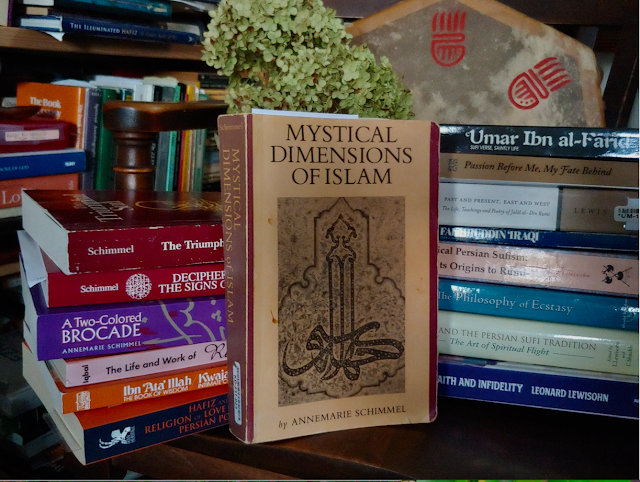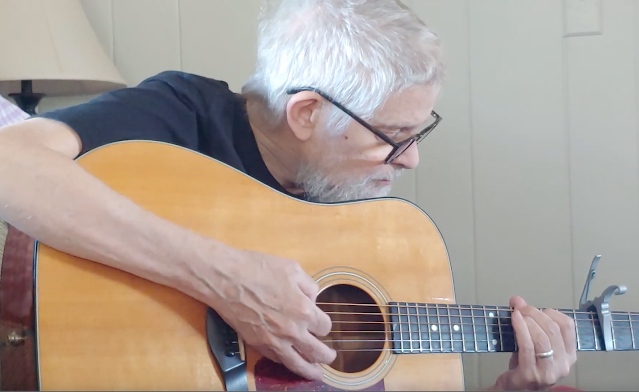Often, if not always, the Path to the Divine appears, at best, only as the body’s weight suspends over the abyss and then, when almost falling, the invisible manifests again, supporting the now-present. A luminous step glimmers, almost immediately disappearing, necessitating moving on. Ibn ‘Arabi, so confusing yet comforting: “Thus it is established that motion belongs to love, for there is no motion in being that is not that of love” (p. 262, Ibn Al-‘Arabi: The Ringstones of Wisdom, Trans. Caner K. Dagli). Courage to continue on, even faced with fear of falling, then may be summoned, founded in the promise of “following the footsteps” of the prophet or priest, Lord of both worlds, even when such tracks shimmer in wonder more than in familiar forms that are touchable with this world’s eyes or fingers.
The person who moves this way, more likely than not, gets seen as “mad” (Majnun) or love-sick. Indeed, the best hint of being on-track frequently comes in the texture of longing and/or of bewilderment; for the Divine surpasses the human. Direction comes in the tones of love; the way includes going via the imaginal world and seems best expressed in the play of poetry. This almost maddening dynamic is wonderfully explored in Michael Sells’ The Translator of Desires, his translation and commentary on Ibn ‘Arabi’s poetry. The endless pursuit of the beloved offers expression for how
“… the divine persona manifests itself in the polished mirror of the heart. Because God or ‘the Real’ is infinite, beyond space and time, its manifestation in space and time lasts only for a moment. In every new moment the manifestation changes. Whoever attempts to hold onto the image locks himself into the dead husk of that manifestation and precludes himself from receiving new manifestations of the divine. The goal is to let go of the previous image in order to be receptive to the divine appearance the next moment within the polished mirror of the heart.” (p. xxvii)
 |
| 5:11 AM |
 |
| 5:53 AM |
Like the traveller on the desert sands, endurance includes seeing the oasis dissolve as mirage; still trusting instead the camel’s scent of water. Body leads the mind. Knowing through the polished heart surpasses hard reason. So it is the beloved mediates the inarticulable between: on one side the experience of human love, on the other Divine. The known and the unknowable.
 |
| (A screensaver appeared while drafting this material.) |
Ibn ‘Arabi elaborates on Moses as a guide finding the way. “The station of Moses… could only be possessed by one who had separated realized knowledge from imagination and illusion” (p. 271, Ringstones). In the Preface, Dagli comments on separation but not severance of knowledge from imagination:
“Indeed, one of the themes of the Fusus is the limitation of the conceptual intelligence in imposing its vision upon the imagination. The former seeks out transcendence and aims to reduce multiplicity to a far-reaching conceptual oneness, whereas the latter perceives and understands the world as a concrete multiplicity of forms and images; it is a vehicle for perceiving the immanence and presence of God. To acknowledge one to the exclusion of the other is to sever man from part of himself.” (p. xi)Holding the tension of the unity alongside this multiplicity allows the “one way” to paradoxically coexist with the integrity of unique authentic pathways for each created being. Crucial to this mystery is the capacity to penetrate through to the essence which is the source and life of each moment of creation.
The Ringstone of Moses elaborates on this with discussion of Moses’ birth mother as providing the breast milk even after he had been placed in Pharaoh’s household.
“Then God forbade him to be suckled by any wet nurse, so that he could receive the breast of his mother…It is the same for the Laws’ knowledge. Recall that God has said, For each of you we have appointed a law and a way (Q 5:48), that is, a path. As for ‘way,’ this means that it ‘came from’ that path. These words indicate the principle from whence it came. It is the source of nourishment… the affair is a new creation without repetition. (pp. 258-9, Ringstones).
Engaging with Ibn ‘Arabi often makes my head swim, but reassurance also comes from his text:
“Now, guidance is that man should be guided to bewilderment, and know that the affair is bewilderment and that bewilderment is unrest and motion, and that motion is life, without stillness and so without death, and is existence without non-existence.” In note 14 to this passage, Dagli adds
“… There is no end to the self-disclosure of God, and no matter how far one journeys through the light the never-ending expressions of the Real will always have the power to maintain the sojourner in his state of lucid drunkenness.” (pp. 256-7, Ringstones)


































